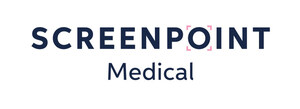The Most Clinically Validated Breast AI Featured in 4 Significant Peer-Reviewed Studies in Past 6 Months, Better Workflow to Increase Screening Capacity for Radiologists and for Women.
VALENCIA, Spain, Sept. 28, 2023 /PRNewswire/ -- ScreenPoint Medical is showcasing global momentum for Transpara, the world's leading Breast artificial intelligence (AI) software, here at the European Society of Breast Imaging (EUSOBI) Annual Scientific Meeting, September 28-30, 2023 (Booth M02).
The clinical and operational value of Transpara on improving the mammography screening process has been documented in several top-tier peer-reviewed publications in the past few months, including the Lancet Oncology, Journal of Clinical Oncology and European Radiology.
Headlining the publications are preliminary results from the first randomized controlled trial in Breast AI: the Mammography Screening with AI (MASAI) Study published this summer in Lancet Oncology. This study investigated use of AI in breast cancer screening to triage 90% of cases to single reading and the results were striking - Transpara-assisted workflow boosted cancer detection (20%) while safely reducing reading workload by 44% with no change in recall or arbitration rate. Transpara is already being used in regions of three European countries to safely replace the second reader in low-risk screening mammograms to deliver more timely care for women; ongoing investigation continues to affirm the value of Transpara in these settings.
MASAI focused on workflow improvements to address a global radiology capacity shortage. As technological advancements offer more ways for radiology to support diagnosis and treatment selection, the work of radiologists is growing in importance. Research using Transpara to improve workflow is not limited to reading volume. Improved breast care for women includes effective risk stratification; two articles studying Transpara and published this year demonstrated that safe and effective risk evaluation may not require a labor-intensive manual data collection process.
Earlier this year, researchers from the Mayo Clinic (Rochester, MN) and University of California, San Francisco confirmed that pairing artificial intelligence (AI) imaging and volumetric breast density algorithms can assist in predicting long-term risk of breast cancer, in particular invasive disease. The study, "Impact of Artificial Intelligence System and Volumetric Density on Risk Prediction of Interval, Screen-Detected, and Advanced Breast Cancer," was published in the Journal of Clinical Oncology. Results showed that the Transpara score improves long-term risk prediction when combined with clinical risk factors including breast density for overall invasive cancers, screen-detected, advanced, and non advanced cancers.
Furthermore, the utility of Transpara in effective and efficient screening-program based risk assessment was evaluated and published as "Assessing Breast Cancer Risk by Combining AI for Lesion Detection and Mammographic Texture." Lauritzen, et al were able to demonstrate that the combination of Transpara-based detection, volumetric density, and a quantitative texture analysis combined to deliver improved risk prediction relative to traditional labor- and data-intensive risk models. Furthermore, further imaging offered for women with the highest Transpara risk DOUBLED the early detection of cancer (finding interval cancer before subsequent visits) relative to traditional models.
One of the strongest drivers of risk for women remains breast density. This fact has driven a global push to better characterize and communicate density. Transpara mitigates some of the detection risk associated with density. To recap: in the first quarter of the year, the study, "Artificial intelligence in BreastScreen Norway: a retrospective analysis of a cancer-enriched sample including 1254 breast cancer cases" published in European Radiology, researchers demonstrated the value of Transpara in supporting earlier detection in women with dense breasts, increasing sensitivity from 63% to 81%. The high proportion of cancers with a Transpara score of 10 indicates the promising performance of Transpara, particularly for women with dense breasts. Results on prior mammograms with a Transpara score of 10 illustrate the potential for earlier detection of breast cancers by using AI in screen-reading.
"As we reach nearly 5 million mammograms analyzed, we are very proud that Transpara continues to demonstrate value for breast health care providers and women when evaluated rigorously. These studies have validated Transpara's performance in helping radiologists detect cancer earlier and safely reduce workload," said Mark Koeniguer, ScreenPoint Medical CEO.
About ScreenPoint Medical
ScreenPoint Medical translates cutting edge machine learning research into technology accessible by radiologists to improve screening workflow, decision confidence and breast cancer risk assessment. Transpara is trusted by radiologists globally because it has been developed by experts in machine learning and image analysis and updated with user feedback from world-renowned breast imagers.
See all the proof at: https://screenpoint-medical.com/published-evidence/peer-reviewed-publications
Photo - https://mma.prnewswire.com/media/2222821/ScreenPoint_Medical.jpg
Logo - https://mma.prnewswire.com/media/1582198/ScreenPoint_Medical_Logo.jpg





Share this article